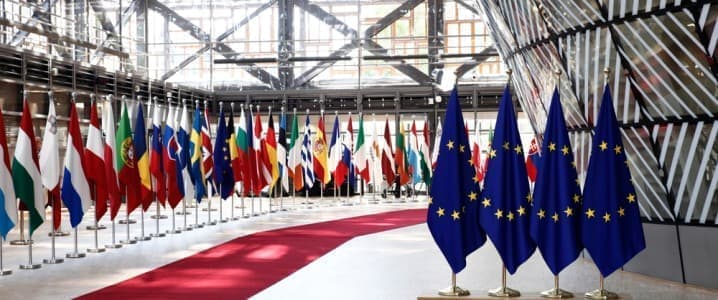The European Commission last week sent out to EU member states its proposal for the next round of sanctions on Russia and Belarus, with a goal to have the package unanimously agreed by the time of the third anniversary of the full-scale invasion of Ukraine in late February. The proposal, seen by RFE/RL, would mean more sanctions targeting Russian aluminum, media, and the so-called “shadow fleet” but would lack any more meaningful restrictions on Russian energy. Brussels is clearly mindful that some member states are wary about soaring energy prices in the bloc.
This proposed round of sanctions, the 16th in three years, comes just a week after Hungary threatened to veto the six-month rollover of the previous packages. Budapest was expressing annoyance that Russian gas to the EU via Ukraine was halted at the new year. While not being able to reverse that decision, Budapest finally gave its green light to the rollover ahead of the January 31 deadline. That came after the bloc agreed on a joint statement in which the European Commission would get assurances from Kyiv regarding the continuation of oil supplies via pipeline to the EU.
It is in this context that the European Commission decided not to propose fresh sanctions on Russian liquefied natural gas (LNG), despite several EU member states, notably in the Nordic-Baltic region, calling for it.
Moscow’s LNG exports to the bloc skyrocketed last year, with 9 percent of Germany’s gas imports coming from Russia. Instead, there will just be minor measures such as the banning of Russian LNG going to EU terminals not connected to the bloc’s gas system and prohibiting the temporary storage of Russian crude oil and petroleum products within the EU.
Deep Background: The headline-grabbing stuff in this round of proposed sanctions is an EU broadcast ban on TASS, Russia’s state news agency. Similarly to the previous rounds of sanctions against RT and RIA Novosti, this means that journalists from these media organizations can still operate in the EU, but you won’t be able to access their content on EU territory. Other Russian media outlets such as Zvezda, Lenta.ru, and RuBaltic will also be targeted.
Then there is the suggested import ban on primary aluminum, the pure form of the metal obtained without recycling or reprocessing, from Russia. Given that import of other types of aluminum are already banned, Brussels is aiming to now have a blanket prohibition of Russian aluminum products entering the bloc. The proposed sanctions also include export bans from the EU to Russia on gaming controllers and consoles, given fears in the EU that their components are being used to build drones.
Drilling Down
Russia’s “shadow fleet” — the network of tankers and other vessels used by Russia to evade Western oil sanctions — will also be targeted, according to the proposal. So far, the EU has drawn up a list of 79 vessels that can’t dock or receive any shipping services in the EU. Under the proposal, an additional 74 vessels would be added — although, curiously, this does not include the vessels involved in recent incidents in the Baltic Sea that damaged undersea infrastructure.Under the proposal, there would be more bans on exporting dual-use goods to companies based in China, India, Kazakhstan, Turkey, and Uzbekistan, among others. Brussels suspects these firms of reexporting such dual-use goods to Russia.Seventeen regional Russian banks would also be subject to being locked out of SWIFT, the global financial message system, for cross-border money transfers, joining most of the big Russian banks that have already been “de-SWIFTED.” Interestingly, though perhaps not surprisingly, Gazprombank, which many EU countries have dealings with, has not yet met this fate.According to the sanctions proposal, an additional 35 people would be slapped with asset freezes and visa bans. They are mainly directors of military companies and politicians Russia has installed in occupied parts of eastern Ukraine. A few names do stick out. One is Kristina Potupchik, a famous Russian blogger, who the EU claims “disseminates misinformation on the war in Ukraine” and the TV presenter Yulia Baranovskaya, who, according to the document seen by RFE/RL, stands accused of “publicly promoting Russian war crimes such as the forced deportation of Ukrainian children.” Aleksandr Stuglev, the organizer of the St. Petersburg International Economic Forum, is also proposed for blacklisting.Lastly, new sanctions on Belarus have been proposed. The sanctions would largely mean EU export bans on electronic devices, conductors, and telecommunications, navigation, and aviation equipment, as well as on various types of sensors and lasers.
By RFE/RL
